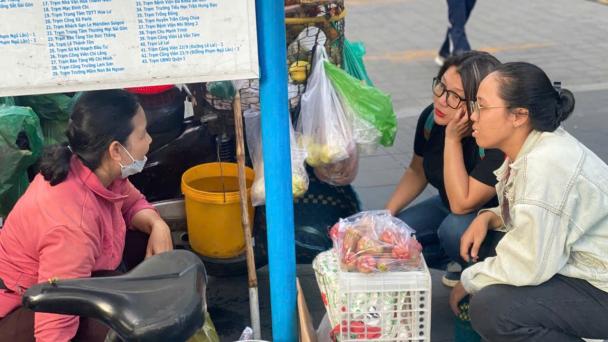When Climate Speaks English

This year’s United Nations Climate Change Conference, more commonly referred to as COP27, is held in Africa, a continent that is least responsible for causing climate change but stands out as one of the most climate-vulnerable regions in the world. There is hope that by holding COP27 in Egypt, a stronger commitment to elevating southern, particularly African, agency and voice is made possible. UN Women, for example, has called for African women to have a bigger voice in the discussions and a larger share of global financing for climate adaptation (women-led organisations only receive 1-3% of the funds). That said, there is also serious trepidation that this will be another meeting of ‘empty promises’ that fails to shift the dial on the climate agenda.
NatCen International’s ongoing work on gender inclusivity in climate action has shown that unless COP27 boldly affirms equity and inclusivity at the heart of climate action, little progress will be made. By equity and inclusivity, we mean a departure from tokenism, and instead cultivating a process of both understanding and acting on the multi-layered vulnerabilities to climate change, which vary from one country to another. This also means ensuring that marginalised groups, regardless of ethnicity, gender, socioeconomics, or sexual orientation are central to the development of policies and actions. Climate change continues to affect people’s lives and their livelihoods including food security, water resources, infrastructure, and human health but they do not affect all people the same way.
If COP27 does not make a clear shift in this direction, the whole process can risk becoming irrelevant especially as global economic growth slows down and wealthier nations prioritise domestic problems. “We have failed to avert climate change, we’ve failed to minimise it, now we have to deal with it. If this doesn’t happen in Egypt, the whole COP process will become irrelevant, unfit for its stated purpose”, says Saleemul Huq, Director of the International Centre for Climate Change and Development in Bangladesh.
In this blog, we propose three priorities through which equity and inclusivity can be embedded in the climate agenda.
Data on climate variability and climate risks in low and middle-income countries remains scarce. This is important because limitations in data (and data of poor quality) have had direct implications for both policy and programming, especially where international engagement is concerned. In East Africa, for example, the difficulty in access to water data is directly linked to the inability to make informed management decisions on water resources. Also, strikingly, the research community in Africa relies heavily on proxy data due to underdeveloped data infrastructure and systems on the continent.
While there are calls to support local agency, international actors remain blind to the specific dynamics of local adaptation and mitigation strategies. As Ovais Sarmad, Deputy Executive Secretary, UN Climate Change highlights, in tackling climate change threats, “we need accurate and current data for adaptation planning”. Stronger data will enable more robust collaboration between international and local actors as well as stronger local agency and ownership and an ability to stay true to the commitment of “leaving no one behind”.
Tackling climate change necessitates addressing deeply entrenched power inequities between northern and southern actors. The climate agenda remains heavily northern dominated. Given past failures to meet commitments from wealthier nations – the pledge to transfer at least $100 billion annually by 2020 to southern countries to tackle consequences of climate change is one example – there is a crisis of confidence between northern and southern actors that needs to be addressed at COP27. Moreover, the already allocated funds to climate action in developing countries are in fact non-refundable grants from richer countries, which consequently deepens pre-existing injustices and power imbalances.
There is also a need to address power inequities in participation at COP. There is lack of genuine space to manoeuvre for national/local civil society organisations and the available space is still dominated by the northern NGOs. As a civil society representative at COP26 stated, “what was also very clear at COP26 was that it was a European COP and there were very few people from the African countries and from the South, Latin America and the East that were at COP”.
Ongoing research by NatCen International on gender inclusivity in climate action has pointed out the importance of understanding how climate action can be more intersectional and gender responsive in the global south. At a roundtable discussion, speakers observed how African women are key players in climate change adaptation in their communities. However, women often lack control over economic resources, which has led to a devaluation of women’s agency. Economic empowerment of women and support to give them stronger decision-making capacity at all levels are both necessary.
Our research also shows that women face overlapping and compounding disadvantages in the climate action sphere. For example, not all women face the same barriers to inclusion, and many – such as agricultural workers – have much to gain from a critical understanding of the power dynamics that underpin climate action. It is also pivotal to understand differences in the roles, responsibilities and rights of differently positioned men and women across institutional scales.
With COP27 underway, our hope is that new pathways towards realising equity and inclusivity are discussed, debated, and heard. Celebrated Indian writer Amitav Ghosh describes climate change as a crisis of the imagination, suggesting that, even as we fail to grasp the enormity of the climate crisis, it is “outrunning us”. With a reaffirmation of equity and inclusivity, COP27 can be an opportunity for us to try to keep pace with change, if not attempt to catch up and outrun it.
Receive a regular update, sent directly to your inbox, with a summary of our current events, research, blogs and comment.
Subscribe